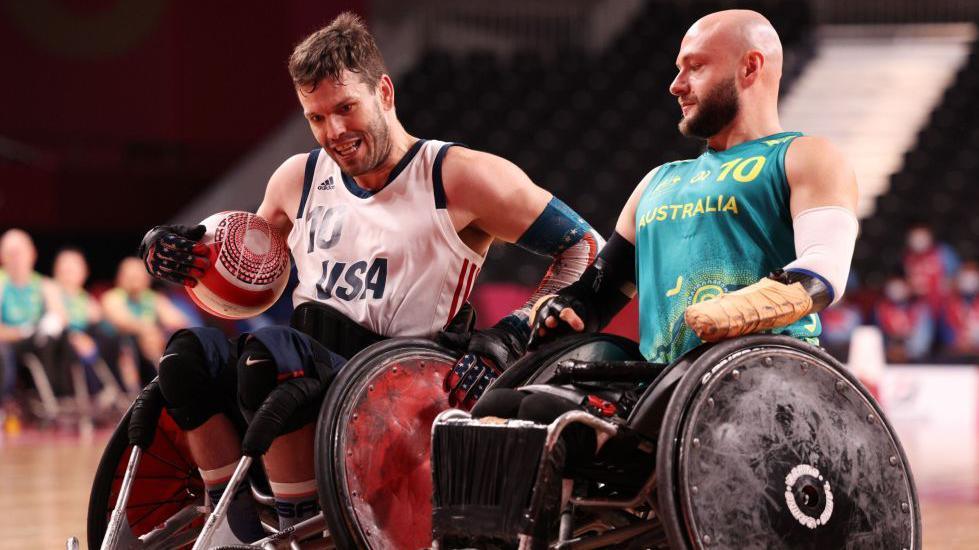Paralympics 2024: A guide to wheelchair rugby at the Paris Games

Joshua Wheeler of the United States is challenged by Australia's Chris Bond
- Published
Key information
Dates: 29 August-2 September
Venue: Champ-de-Mars Arena
Gold medals on offer: One
What are the rules of wheelchair rugby?
Wheelchair rugby is played indoors on a regulation-size basketball court by teams of four, using a white ball that is identical in size and shape to a volleyball. Teams are mixed, with men and women both competing in the same team.
A match consists of four eight-minute quarters and the team scoring the greatest number of goals wins. If teams are level at the end of regulation play, it goes to a three-minute overtime period.
To score, an athlete must cross the opposing team's goalline in firm control of the ball. Two wheels must cross the goalline for a score to count.
Athletes must dribble or pass the ball every 10 seconds with failure to do so resulting in the referee handing possession of the ball over to the opposing team.
Contact between wheelchairs is permitted and forms an integral part of the game. However, hitting an opponent's chair behind the rear wheel results in penalisation, as does making physical contact with an opponent.
Players may lose possession of the ball, serve a one-minute penalty or be disqualified depending on the extent of the foul committed.
Athletes with tetraplegia or conditions including polio, cerebral palsy, muscular dystrophy and amputations are classified with a points system from 0.5 (highest level of impairment) up to 3.5.
In general, 0.5 and 1.0 players are blockers and do not handle the ball as much as higher class players. This is mostly because of a high level of impairment in their upper limbs that means these players may not easily pick up or pass the ball.
1.5 players are predominantly blockers but may occasionally handle the ball. 2.0 and 2.5 players are both ball handlers and, because of an increasingly high level of strength in their shoulders, can build up speed on court. This makes them good 'playmakers'.
3.0 and 3.5 players have a high degree of strength and stability in the trunk and are therefore usually the fastest players on court. The higher functionality in their upper limbs means they can handle and pass the ball comparatively easily.
In international wheelchair rugby, the total number of points of all four athletes playing on court at any one time cannot exceed 8.0 points unless there is a woman on the court, in which case the team are allowed an extra 0.5.
Which athletes are competing for GB in Paris?
Great Britain claimed a historic gold medal in Tokyo – their first Paralympic medal in the sport.
Since then, they lost to eventual winners Australia in the quarter-finals of the 2022 World Championships and have won two European silver medals, losing both finals to France having won gold in 2015, 2017 and 2019.
The squad features seven players who won gold in Tokyo, including Gavin Walker and Stuart Robinson, who are captain and vice-captain this time, as well as Aaron Phipps and Jonny Coggan, who has appeared at every Games since Athens 2004.
They will be joined by five Paralympic debutants as they aim to win back-to-back medals at a Games.
Who are the other challengers?
The eight-team tournament is packed full of quality and all of the teams will fancy their chances.
Japan, who recently won the Canada Cup, the last major international tournament before Paris, won bronze on home soil in 2021 are in Pool A.
They are joined by the number one-ranked side in the world, the USA, who have won three golds in the sport but were beaten in the final in both Rio and Tokyo, as well as Canada and Germany.
Defending champions GB are in Pool B alongside Australia, the 2012 and 2016 gold medallists who missed out on a medal in Tokyo but are the current world champions after being the USA in the final in 2022.
Hosts France and Denmark complete the line-up.
Did you know?
The home side will be captained by Jonathan Hivernat who already has an impressive sporting pedigree.
As a teenager, the Toulouse-based player was diagnosed with Charcot-Marie-Tooth Disease - a degenerative condition which leads to nerve damage - and is now a wheelchair user.
He is a keen sportsman and competed at the 2016 Paralympics, where France were seventh, and then in Tokyo in 2021, where they were fifth, and led his nation to two European titles in 2022 and 2023.
Hivernat is also a wheelchair rugby league international and represented France at the 2021 World Cup in England, scoring in the pool games against Wales and USA but did not figure in the final, where England defeated the French.
ParalympicsGB Tokyo medals
One - gold